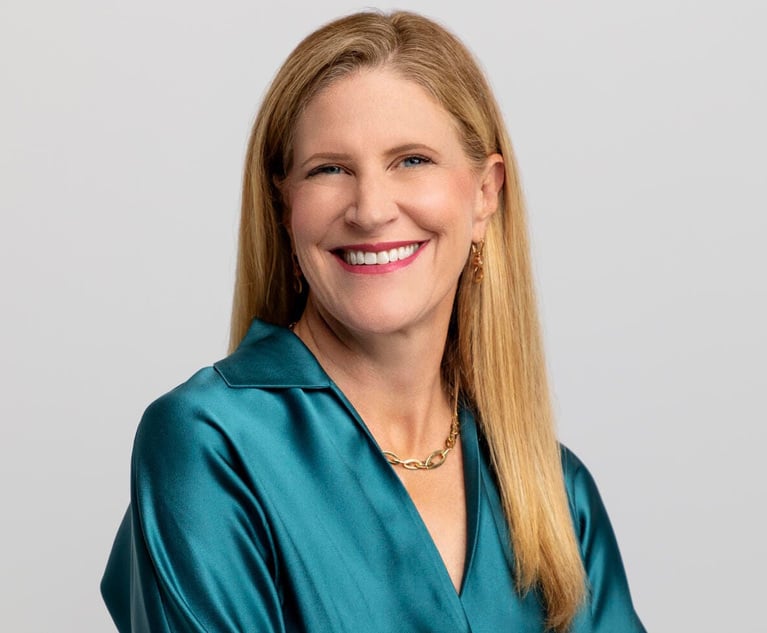Florida Appeal Court Ruling in Money Transmitter Case Highlights Changing Cryptocurrency Law
A recent ruling by the Third District Court of Appeal in Florida highlights how laws have been evolving around the treatment of cryptocurrencies, prominent blockchain/digital currency lawyers say.
February 06, 2019 at 05:56 PM
3 minute read
 Photo: Anastasiia Ivanova/Shutterstock.com
Photo: Anastasiia Ivanova/Shutterstock.com
A recent ruling by the Third District Court of Appeal in Florida highlights how state and federal laws are evolving around the treatment of cryptocurrencies.
Joshua Ashley Klayman, a noted blockchain/cryptocurrency attorney who left Morrison & Foerster to start her own boutique firm Klayman last year, said, “While a few years ago, some may have believed, erroneously, that the creation of new technologies were altogether exempt from existing laws and regulatory frameworks, we have seen, and continue to see, a maturation of the crypto industry and a recognition that, in many cases, existing laws apply.” Klayman stressed she is not a litigator and isn't licensed to practice law in Florida.
 Joshua Klayman is the Managing Member of Klayman a boutique blockchain law firm based in New York, and the CEO of Inflection Point Blockchain Advisors, LLC, a blockchain consulting firm.
Joshua Klayman is the Managing Member of Klayman a boutique blockchain law firm based in New York, and the CEO of Inflection Point Blockchain Advisors, LLC, a blockchain consulting firm. Last week, the Florida appellate court reversed a lower court's 2016 decision by finding that cryptocurrency is indeed a financial or monetary instrument under state law. The case involved Miami Beach resident Michell Espinoza, who is charged with money laundering and acting as an unauthorized money transmitter for allegedly operating digital currency-trading website, as reported by sibling publication Daily Business Review. The appellate court ruled the trial court erred in dismissing the charges and remanded the case for further proceedings. Espinoza didn't dispute that he was not licensed to act as a money services business in the state, according to court documents.
Espinoza's attorney, Frank Prieto, said, “We respectfully disagree with the ruling. We think they made a big leap claiming that he was in the business of money transmitting. It sets a dangerous precedent for anyone selling personal property that they could be facing a criminal penalty for not having a money services business license.”
Klayman said the appeals court ruling demonstrates an increased understanding of the nuances in digital tokens. “We have seen more generally that a variety of different regulators, even within the United States, have asserted overlapping jurisdiction over virtual assets. For instance, one regulator may deem a digital token to be a form of property, while another classifies it as a commodity, yet another calls it a security, and another treats it as money.”
 Gary DeWaal, Katten Muchin Rosenman
Gary DeWaal, Katten Muchin Rosenman Gary De Waal, special counsel at Katten Muchin Rosenman in New York, who examined the case in his own blog, said in a brief interview: “What we tell clients is that just because last week you thought a state money transmitter regulator had a certain view on an exchange's cryptocurrency transactions, don't assume it is the same this week. You really have to stay on top of this one because the repercussions are quite severe for getting it wrong and state views are changing regularly.”
This content has been archived. It is available through our partners, LexisNexis® and Bloomberg Law.
To view this content, please continue to their sites.
Not a Lexis Subscriber?
Subscribe Now
Not a Bloomberg Law Subscriber?
Subscribe Now
NOT FOR REPRINT
© 2025 ALM Global, LLC, All Rights Reserved. Request academic re-use from www.copyright.com. All other uses, submit a request to [email protected]. For more information visit Asset & Logo Licensing.
You Might Like
View AllVisa's Defense of DOJ Antitrust Case Suffers Setback After Court Denies Motion to Dismiss

Wells Fargo and Bank of America Agree to Pay Combined $60 Million to Settle SEC Probe

Amex Latest Target as Regulators Scrutinize Whether Credit Card Issuers Deliver on Rewards Promises

Former Capital One Deputy GC Takes Legal Reins of AIG Spinoff
Trending Stories
- 1Am Law 200 Firms Announce Wave of D.C. Hires in White-Collar, Antitrust, Litigation Practices
- 2K&L Gates Files String of Suits Against Electronics Manufacturer's Competitors, Brightness Misrepresentations
- 3'Better of the Split': District Judge Weighs Circuit Divide in Considering Who Pays Decades-Old Medical Bill
- 4Which Georgia Courts Are Closed Today?—Here's a List
- 5After DEI Rollbacks, Employment Lawyers See Potential For Targeting Corporate Commitment to Equality
Who Got The Work
J. Brugh Lower of Gibbons has entered an appearance for industrial equipment supplier Devco Corporation in a pending trademark infringement lawsuit. The suit, accusing the defendant of selling knock-off Graco products, was filed Dec. 18 in New Jersey District Court by Rivkin Radler on behalf of Graco Inc. and Graco Minnesota. The case, assigned to U.S. District Judge Zahid N. Quraishi, is 3:24-cv-11294, Graco Inc. et al v. Devco Corporation.
Who Got The Work
Rebecca Maller-Stein and Kent A. Yalowitz of Arnold & Porter Kaye Scholer have entered their appearances for Hanaco Venture Capital and its executives, Lior Prosor and David Frankel, in a pending securities lawsuit. The action, filed on Dec. 24 in New York Southern District Court by Zell, Aron & Co. on behalf of Goldeneye Advisors, accuses the defendants of negligently and fraudulently managing the plaintiff's $1 million investment. The case, assigned to U.S. District Judge Vernon S. Broderick, is 1:24-cv-09918, Goldeneye Advisors, LLC v. Hanaco Venture Capital, Ltd. et al.
Who Got The Work
Attorneys from A&O Shearman has stepped in as defense counsel for Toronto-Dominion Bank and other defendants in a pending securities class action. The suit, filed Dec. 11 in New York Southern District Court by Bleichmar Fonti & Auld, accuses the defendants of concealing the bank's 'pervasive' deficiencies in regards to its compliance with the Bank Secrecy Act and the quality of its anti-money laundering controls. The case, assigned to U.S. District Judge Arun Subramanian, is 1:24-cv-09445, Gonzalez v. The Toronto-Dominion Bank et al.
Who Got The Work
Crown Castle International, a Pennsylvania company providing shared communications infrastructure, has turned to Luke D. Wolf of Gordon Rees Scully Mansukhani to fend off a pending breach-of-contract lawsuit. The court action, filed Nov. 25 in Michigan Eastern District Court by Hooper Hathaway PC on behalf of The Town Residences LLC, accuses Crown Castle of failing to transfer approximately $30,000 in utility payments from T-Mobile in breach of a roof-top lease and assignment agreement. The case, assigned to U.S. District Judge Susan K. Declercq, is 2:24-cv-13131, The Town Residences LLC v. T-Mobile US, Inc. et al.
Who Got The Work
Wilfred P. Coronato and Daniel M. Schwartz of McCarter & English have stepped in as defense counsel to Electrolux Home Products Inc. in a pending product liability lawsuit. The court action, filed Nov. 26 in New York Eastern District Court by Poulos Lopiccolo PC and Nagel Rice LLP on behalf of David Stern, alleges that the defendant's refrigerators’ drawers and shelving repeatedly break and fall apart within months after purchase. The case, assigned to U.S. District Judge Joan M. Azrack, is 2:24-cv-08204, Stern v. Electrolux Home Products, Inc.
Featured Firms
Law Offices of Gary Martin Hays & Associates, P.C.
(470) 294-1674
Law Offices of Mark E. Salomone
(857) 444-6468
Smith & Hassler
(713) 739-1250






